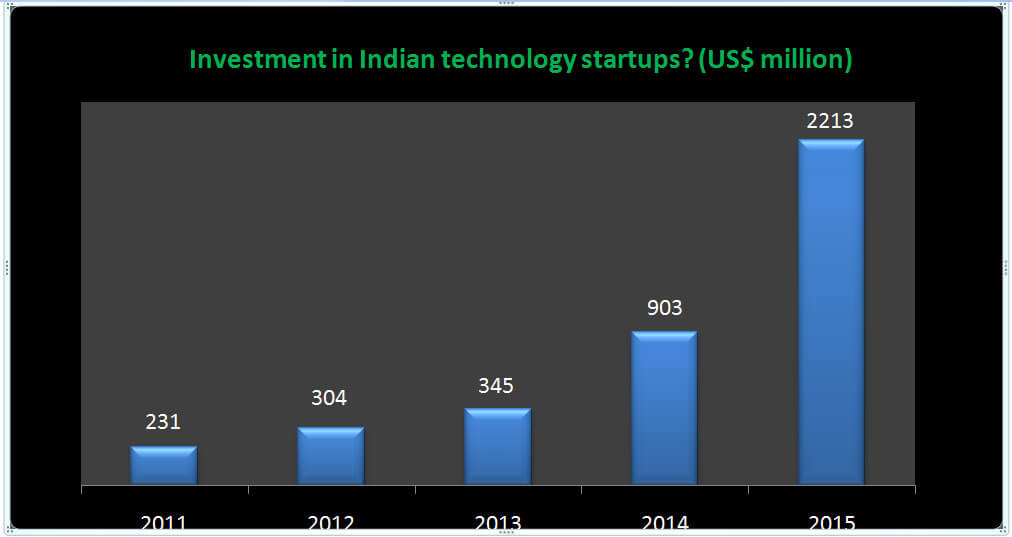Thousands of young engineers dream of becoming next Steve Jobs or Mark Zuckerberg, from their desks in Indian cities of Bengaluru, Hyderabad & Pune. [1] More and more young people in the country of 1.26 Billion people are opting to go it alone, in stark contrast to previous generations that valued the stability of employment above all else. The area of interest varies from robots to mobile apps to smart kitchens and a cocktail-making machine. Tthe regional offices in Bangalore, which houses one of India’s biggest startup incubators, is a real ideas factory. Every meeting room bears a photo of a successful technology entrepreneur. Welcome to Technology startups in India.
On the occasion of Independence Day of India, PM Modi launched Start-up in a bid to accelerate start-up revolution in the country. It was already getting the strong acceptance from the young generation, and the program backed them in a significant way. A few decades ago, India had an era where only manufacturing start-ups established, and they aided by financial institutions of state & centre governments. [2] However, with continuous support and programs like Startup India, Digital India and Make in India from government total tech startups in India are expected to increase to 11,500 by 2020(from 3600 in 2010).
Rise in number of technology startups in India
Currently, India has more than 4, 700 tech start-ups which are highest in the world after US and Britain. Most fascinating aspect is they are fast developing. Entrepreneurs from the country are working on the drones and applications which can obtain more data from large farms of Brazil, Australia & others. [3]
Following graph indicates amount of funding received for startups in India from 2011-2015

Image Courtesy of economictimes.indiatimes.com
| Recommended for you | |
| Challenges faced by digital health startups | |
| 10 Digital health technologies empowering patients | |
| 300 Innovative digital health startups in India |
Total funding received by technology startups in India and hottest segments
Indian VC companies received a total investment of $12 billion from over 1,200 deals in last two years. Interestingly, about $7.3 billion invested in a period of 2015-16. [4] An expert believes, right now it’s tough for investors and startups to list in India, which is why we see so many of them relocate outside the country’s borders. Exits through IPOs in India will take at least another 5-7 years. Several tech startups have witnessed three-year average revenue of more than thousand percentages which is staggering. Several dominant consumer driven tech-startups (such as e-commerce portals, food-tech sites) enjoyed soaring valuations as well. The biggest section of Indian startups is filled up by E-commerce sector (33%). India’s E-commerce market is expected to reach US$ 220 billion regarding gross merchandise value (GMV) and 530 million shoppers by 2025.
Top startup sectors
| Startup segment | Funding ( in million ) |
|---|---|
| Ecommerce | US$ 433.2 |
| Food | US$ 113 |
| Medical | US$ 140.2 |
| Entertainment | US$ 141 |
| IT | US$ 210 |
- E-commerce: E-commerce field occupies the most significant segment of start-ups in India. The sector is estimated to reach about US$ 220 billion regarding gross merchandise value by 2025. [5]
- Food: In recent years, a large number of food start-ups have established in India. Investors and entrepreneurs have also shown an enormous amount of interest as food is a particular interest of Indian population. These start-ups need further backing to remain focus on the advanced ways of attracting users. [6]
- Medical: India’s Pharma Industry is anticipated to be in top 10 global markets, regarding valuation. A Large part of the population has become aware of the significance of addressing diseases at the right time. [7] With innovative startups like Practo, Lybrate, and 1mg in the digital healthcare industry, the process of meeting doctors has redefined. [8] Medical home delivery services multiplied in recent time, and this has created a large number of openings.
- Entertainment: Entertainment and media industry in the nation is a growing sector in the economy with high growth strides. Healthcare industry is experiencing rapid growth, and it has shown the flexibility to progress. Due to digitisation, Internet has become the main mode of accessing information & entertainment.
- Information Technology: The enterprise software market in India is projected to rise in the coming years. The requirement of comprehensive business software has developed and therefore increased the need to save IT costs. Legal firms are helping innovative star-ups by offering them the licensed software and acquire new business under their belt.
Rate of failure and reasons why technology startups in India fail
It is natural that all of the newly established start-ups won’t survive until the end. It is because most of them do not get proper mentoring. It has never been so easy to launch a start-up thanks to some resources one get. The power of information and networking has also helped considerably. As a result, the pace of change is speeding up, and the implications of this are immense.
- Problems with management teams: Venture Capitalists accredited 65% of the difficulties to the management failures. The rising economic importance of start-ups and lessened barriers to the launch a product has boosted entrepreneurship environment across the globe. Numerous firms like TechStars, 500 Start-ups and Seedcamp also enhanced the condition. [9] Moreover, many young graduates and engineers see entrepreneurship as a desirable career option. Nonetheless, despite broad information, it is difficult to examine the pattern of successful start-ups.
- Overestimating market opportunity or lack of focus: Several start-ups fail to prosper due to lack of self-insight instead of market competition. For the less than 10% of startups that do succeed, most encounter several near death experiences along the way. Angel or Seed companies have a 90% fail rate. Numerous founders do not know the direction in which they should focus and get diluted easily. Usually, they are guided by advice which is often unhelpful. Some founders often anticipate the market as new as they have not raised an over-estimate investment during early stages.
- Premature scaling: More than 74% of start-ups failed due to Pre-mature scaling. It means they have primarily spent on the advertising, marketing and hiring instead of realising a feasible business model. It is the most common reason for startups to perform worse. They tend to lose the battle early on by getting ahead of themselves. According to reports, tech start-ups have the highest ratio of failure as they are involved in several worries of launching an innovative product. [10] Importantly, most successful founders get driven by impact rather than experience or money. Failures will still happen – in the first year, the first five, and many years after that. There are challenges and obstacles at every stage of the business lifecycle. But it is time to scrap that cautionary tale of how 8 out of 10 startups fail. It is time to recognize their success and contribution, not as lessons in failure, but as a bolster to the economy and business growth.Indian Start-ups received a large amount of investment as a record number of deals closed in the year 2016. Additionally, there are several expectations from 2017. [11]While the year ends on a pleasant note, there are many expectations from 2017. Finance tech sector is most prominent beneficiaries of India’s digital push. With recent innovations and developments, the edu-tech industry is also expected to gain more funds. [12]
Image credit: www.istockphoto.com

















